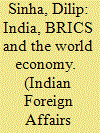| Srl | Item |
| 1 |
ID:
140022


|
|
|
|
|
| Summary/Abstract |
BRICS is not an organised coalition seeking to create its own international order. It lacks adequate homogeneity and shared ideology for that. It is a pressure group of countries which want to be included in the decision-making forums of the international financial system. They feel that they have earned their place, and their credentials must be recognised. The slowdown in the growth rate in all BRICS countries, except India, has prompted many western experts to predict its demise. This appears to be an expression of desire rather than the result of objective analysis. The future shape of BRICS will depend on how the high priests of the present order react to their legitimate demands. What began as a prescient tip of a farsighted investment banker may either result in the reorganization of the existing system or lead to the setting up of a rival structure. The world would be better off in both eventualities
|
|
|
|
|
|
|
|
|
|
|
|
|
|
|
|
| 2 |
ID:
097197


|
|
|
|
|
| Publication |
2010.
|
| Summary/Abstract |
One year after the 2008 crash, policy makers and international lending institutions declared the crisis over and assured the world that recovery was underway. The efforts of the Group of Twenty (G20) have been widely credited with securing economic recovery. In this article I examine the politics of representation of the crisis by the G20. I argue that the G20 summits have served to naturalise and depoliticise the crisis, thereby legitimating a narrow and very particular response to it. The politics of representation is bound up in what I term 'financial fetishism'. To demonstrate and explain how and why the G20 summits have engaged in a politics of representation alongside a politics of management, I proceed from an abstract to a concrete level of analysis by, first, revealing the social construction of neoliberal-led growth and the subordination of all social life to the rationality of the market, and, second, comparatively exploring the discourse of the G20 summits of 2009 and their predecessor: the New International Financial Architecture of 1999.
|
|
|
|
|
|
|
|
|
|
|
|
|
|
|
|